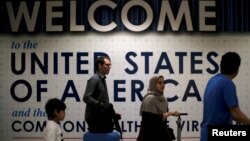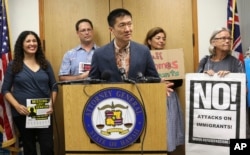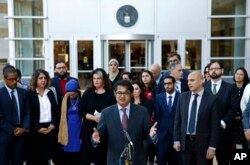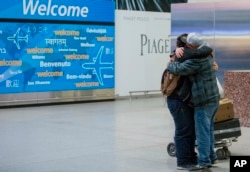A federal judge in Hawaii has blocked President Donald Trump’s latest order restricting travel which was to go into effect at 12:01 a.m. Wednesday.
The ruling by Judge Derrick Watson prohibits restrictions on travelers from six countries that the Trump administration said could not provide enough information to meet U.S. security standards.
The travel order would have barred to various degrees travelers from Chad, Iran, Libya, Somalia, Syria and Yemen.
Watson's temporary restraining order did not interfere with restrictions on North Korea and Venezuela.
The new travel order "suffers from precisely the same maladies as its predecessor: it lacks sufficient findings that the entry of more than 150 million nationals from six specified countries would be 'detrimental to the United States,'" Watson wrote in his opinion.
The suit was filed by the state of Hawaii, the Muslim Association of Hawaii and various individuals.
The travel order was also scrutinized in a Maryland courtroom on Monday.
In a 90-minute session, U.S. District Judge Theodore Chuang heard arguments brought by advocacy groups led by the International Refugee Assistance Project, which argued that the current travel order still amounts to a Muslim ban and that it exceeds presidential authority.
Chuang asked about information the new, more targeted order was based on, specifically a classified Department of Homeland Security report that government lawyers have said was the basis for the new order.
While Chuang blocked a key part of Trump’s second travel order in March, he did not indicate how he might rule. Nor did he say if he would issue a ruling before the order takes effect.
‘Tailored’ approach
Trump said in the September 24 proclamation, announcing the new order: "As president, I must act to protect the security and interests of the United States and its people. The restrictions announced are tough and tailored, and they send a message to foreign governments that they must work with us to enhance security."
The new ban dropped Sudan from the list, but it added Chad, Venezuela and North Korea to the original six Muslim-majority countries. And in each case, the directive varies. For Syria and North Korea, all immigrants and visitors are banned. The same is true of Iran, except that students are exempted.
Immigrants and people on business or tourist visas are blocked from Chad, Libya and Yemen. Visitors from Somalia may come to the U.S. while immigrants are barred. In the case of Venezuela, only certain government officials are disallowed.
The September proclamation provides varying rationales for the new strictures, thought to be more defensible in court than something more sweeping:
"North Korea does not cooperate with the United States government in any respect and fails to satisfy all information-sharing requirements," the presidential declaration said.
Venezuela was cited for failing to cooperate "in verifying whether its citizens pose national security or public-safety threats." U.S. officials also said the Caracas government does not willingly receive Venezuelans deported by the United States.
Chad, a "valuable and important" counter-terrorism partner, failed to share terrorism-related and other public safety information, the proclamation said.
Chad has responded by pulling troops from the fight against Boko Haram in Niger.








